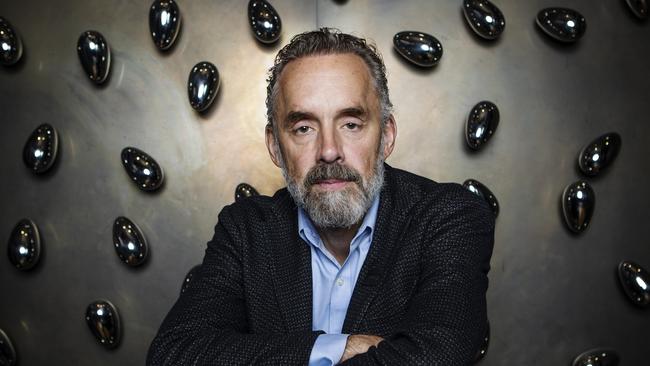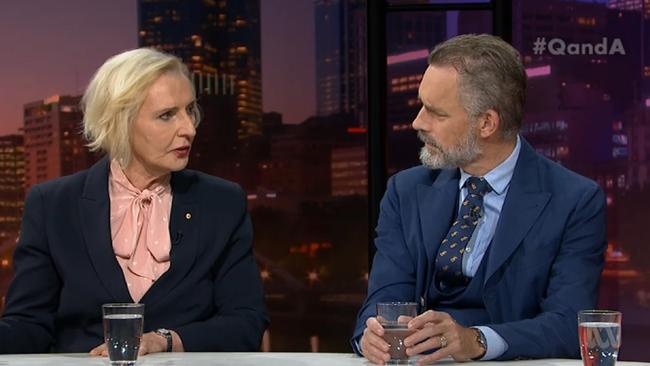The mysterious rise and fall of Jordan Peterson
Jordan Peterson has turned out to be the self-help guru unable to help himself.

Instagram last week featured a photograph of Canadian psychologist Jordan Peterson dining out in Belgrade. He had in front of him one of those steaks seen in Flintstones cartoons — it had bone like the handle of a hammer — but Peterson was not smiling the way a person normally smiles when presented with something delicious.
He looked drawn, and physically weak. He is spiritually deflated, which makes sense: it’s been a hell of a year.
Readers will remember that Peterson came to Australia in February 2019 to promote his international bestseller, Twelve Rules For Life. Live shows, during which he prowled the stage dispensing life advice, were sold out across the nation. Peterson was already a rock star, having built an enormous following on YouTube of young men, mainly, some of whom were groping for male role models in a culture that no longer sees much virtue in masculinity.
He was to them a mystical figure. They drew comfort from his old-school advice: stand up and take responsibility for your life. Make your bed and get your house in order.
Peterson was invited to appear on Q&A, alongside writer Catherine McGregor, who is transgender. She says she suspected “the ABC invited me because they wanted fireworks. He was unfailingly courteous. I noticed that about his followers, too”.

The Q&A format did not really suit Peterson — then-host Tony Jones began the show by insisting everyone keep their answers to one minute — but his tour was an immense success.
That said, he did while in Australia display curious, even troubling behaviours. The obsessive diet, for example. Peterson was eating only meat. Literally only meat, salt and water, to the point where he had taken to carrying a zip-lock bag filled with cold steak on his person, in case he was caught short somewhere without access to meat. He was also keeping an insane schedule — multiple interviews, flights and shows every day — which left him fatigued.
Peterson disappeared from public life soon after leaving Australia. Rumours as to the state of his health since then are legion: he became addicted to prescription painkillers (true); he had to go to detox (true); he’s had pneumonia (true); suffered neurological damage (true); he’s got problems with his relationship with his adored son (true); he contracted COVID-19 (also true.)
As I said, the year from hell.
Daughter Mikhaila has largely been in charge of her father’s treatment plan, and recently recorded a “family update” with him, for her own YouTube channel.
“Hey, Dad,” she says, to which Peterson wearily replies: “Hey kiddo.”
She asks: “What the hell happened?”
Well, what didn’t?
Over the next hour, Peterson explains how things began to unravel for him shortly after he was told his wife, Tammy, who had been anticipating cancer surgery while she was still in Australia, had not an easily treatable form of the disease, but a “fast-growing cancer, with a something like a near 100 per cent fatality rate”.

The idea that he might lose her was discombobulating. The couple have known each other since they were children. They grew up on the same street. In thinking about her possible death, Peterson began to experience severe anxiety, eventually asking his doctor to increase the dose of benzodiazepine tablets he had been taking since Christmas 2016.
But why had he been taking them in the first place? Peterson has long struggled with depression, but was prescribed sedatives after he ate something in Vancouver around Christmas 2016 that didn’t agree with him. The whole family got sick, he said, but his symptoms were particularly troubling.
“I was freezing cold for about a month, I couldn‘t get warm no matter how much I wore,” he says. “I couldn’t stand up without fainting. I couldn’t sleep. I don’t think I slept at all for something in the order of three weeks.”
This is of course not plausible, and when Peterson made the claim on Joe Rogan’s podcast some years ago, viewers called him out. He is, after all, a great defender of precise speech (it’s one of his Rules for Life: tell the truth; at least, don’t lie). He now says “it’s impossible to stay awake involuntarily for that long … but I slept little enough that it was exceedingly unpleasant”.
Back in Toronto “our family physician prescribed benzodiazepines, which are often used as a sleeping aid and an anti-anxiety medication. I took the benzodiazepine the way that it was prescribed … I thought it was a relatively harmless drug and I was taking it in a prescribed fashion, at not too high a dose”.
He did not get any kind of “high”, which encouraged him in his belief that the drugs were relatively benign. But he soon developed “a weakness on his left side”, but worse, “a feeling of detachment from people around me, people I loved, some decrease in the ability to experience joy … I became quite isolated from my family members … it was most noticeable in my relationship with my son, Julian, but it was like there was a barrier up between me, and millions of people”.
When Tammy became ill, Peterson’s doctor agreed to increase his dose to help him cope, but it made him more anxious. “So, it seems like I had a rather uncommon, but not unheard of, reaction, where an increased dose makes anxiety worse,” he says. So he decided to quit the benzodiazepines and try ketamine, “which is a treatment for depression, and it was a bad idea”. He then tried to quit both drugs immediately, which was “a very bad idea”.
Peterson says he had done “a lot of scientific research (as a student) … but what I knew about benzodiazepines was that they were comparatively safe compared to barbiturates … but that‘s much less true than everybody who’s taking them hopes”.
In fact, the probability of developing a dependency is high; many people who start these drugs stay on them for life. Peterson wanted to quit but describes the process of tapering as “unbelievably, unbearably unpleasant”. He developed akathisia, a condition characterised by an extreme physical restlessness and mental turmoil.
“It was like being jabbed with something like a cattle prod, something electric, sharp, non-stop, for all the hours I was awake,” he says. “I couldn‘t sit or lay down or stop moving. And even if I did get up and move, it wasn’t like that made it better, I just couldn’t stop … it was horrible, it’s like being whipped. It sounds melodramatic, but I think if I had to pick whipping or akathisia … a cat-o’-nine-tails, that might be worse, but it was plenty bad. And things just fell apart more and more.”
In detox, the body will often start to create the symptoms that demand the drugs it craves. It’s possible for a patient get anxious to the point where they are screaming, flailing and frothing. They may then begin doping themselves further, to maintain the level of calm needed to function. Peterson began taking more of the sedatives to try to dampen the symptoms of withdrawal. It did not work. A patient with a severe dependency of this type needs to be supervised — meaning hospitalised — to manage the possibility of seizures, or physical breakdown, as they try to taper.
Peterson sought inpatient treatment in the US but says it was useless. Against the advice of his psychiatric team, by this stage deeply concerned for his welfare, his family decided to move him to a private rehabilitation clinic outside Moscow.
This was possibly done to observe his anonymity and privacy. But Mikhaila’s husband, Andrey Korikov, is Russian, and he seems to have some influence. Peterson says the decision to go against the advice of his treating physicians, to undergo what is a “generally unadvised treatment” called ultra-rapid detoxification in Russia, was made in desperation.
The clinic wanted to put Peterson into a coma, to enable him to avoid the worst of the symptoms of withdrawal. He says they gave him Propofol — large doses of which killed stars Prince and Michael Jackson — to sedate him for nine days, and the outcome was terrifying. Peterson was catatonic, then delirious, for almost two weeks. He remembers only one day of the treatment, during which he also battled pneumonia, and that’s because he woke up “being secured to the side of the bed because apparently I was tearing out the cords”.
In the aftermath, “I couldn‘t type because I couldn’t remember how to put my hands on the keyboard … I couldn’t do up buttons … one night I got up to use the washroom, I couldn’t remember how to lay down. I tried for several minutes. I couldn’t remember the sequence of actions that would enable me to lay down”.
His life by this stage had completely unravelled. He could not work, write or teach; and his relationship with Tammy, who recovered quite well from cancer surgery, was under pressure. He has not been able to see her for more than a few days since mid-December “partly because I was in bad shape, and because she wasn’t in good enough shape to be patient with me … I was suffering so much that anyone around me suffered”.
From the clinic in Moscow, the family took Peterson to another in Florida, then to another in Belgrade, where he was staying when the steak photograph was taken. He had begun to feel better but then, three weeks ago, he contracted coronavirus, from which he is still recovering.
Peterson says he has over the past year received thousands of messages of support, which has “really taken me by surprise, because you know it‘s one thing to express your condolences if you’re discussing someone who, like my wife, is suffering from something clearly not of her making — cancer — but a dependence is more ethically questionable, right? Because you think, well, the person obviously made some errors in choice that contributed to this”.
But, he says, “in my lectures and my writings, I‘ve never suggested that I was anything other than one of the people who also needed to learn these lessons”. He knows many readers will want to know how this could have happened “because, I wrote a self-help book. I’m a psychologist. It’s like, why the hell didn’t I see this coming? Why wasn’t I more cautious?”.
They are reasonable questions, to which he will need to find answers. Some may seem obvious: all human beings are fallible. Anxiety is commonplace. Many high-achieving people struggle when events threaten to roil out of control. When a loved one becomes ill, for example, it can feel cataclysmic. Some of the side-effects of fame — in particular, the adulation of strangers — are unsafe for almost everyone. And benzodiazepines are extremely addictive.
“It‘s very probable that someone in your family is currently taking benzodiazepines or will be prescribed them in the future for long enough to develop a dependence,” Peterson says. “It’s like people need to know … these drugs are for short-term treatment of stress-induced anxiety.”
It is not yet known whether Peterson will ever be well enough to return to public life and he knows some people will question the worth of his advice anyway: “Like, why would anyone take anything I say seriously? And I guess what I would say is if you’re going to wait to learn from people who don’t make mistakes, or don’t have tragedy into their life …”
Well, you know the rest. And yes, of course there has been some online glee about the predicament in which Peterson finds himself. Some have suggested he was never more than charlatan but, for others, the feeling is one of understandable disappointment, like he somehow talked the big talk and turned out not to have the answers. Like anyone does.


To join the conversation, please log in. Don't have an account? Register
Join the conversation, you are commenting as Logout